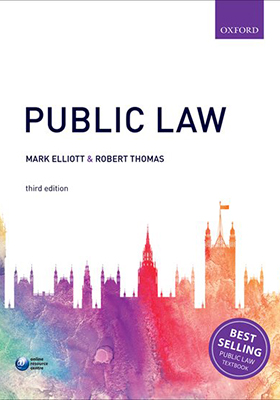 The third edition of Public Law, written by Mark Elliott, Professor of Public Law at the University of Cambridge, and Robert Thomas, Professor of Public Law at the University of Manchester, has been published by Oxford University Press. Public Law is the UK's best-selling textbook in the field, and has been described by Professor Jeff King of UCL as "a modern classic".
The third edition of Public Law, written by Mark Elliott, Professor of Public Law at the University of Cambridge, and Robert Thomas, Professor of Public Law at the University of Manchester, has been published by Oxford University Press. Public Law is the UK's best-selling textbook in the field, and has been described by Professor Jeff King of UCL as "a modern classic".
Public Law adopts a distinctive approach to a subject that students often find difficult and disjointed. In particular, the book identifies three major themes that characterise contemporary British public law — namely, executive dominance and the need for effective accountability; the multi-layered nature of the modern constitution; and the move from a more-political to a more-legal form of constitutionalism. It uses those themes as threads to facilitate navigation and to enable readers not only to come to terms with the detail of the subject, but also to engage with its broader narratives. The book is pedagogically innovative in other respects, too. It makes extensive use of visual aids - such as diagrams and charts - in order to present information in an engaging and accessible manner, while each chapter is accompanied by an "expert commentary". The commentaries are written by a leading academics from across the UK, and expose readers to a variety of perspectives on and approaches to the discipline. In this way, the book introduces readers to the contestable - and contested - nature of public law as a subject.
The third edition has been extensively updated and many chapters have been fundamentally rewritten in the light of recent developments. For instance, the chapter on the constitutional implications of EU membership has been rewritten in order to take account of the UK’s impending departure from the European Union, and undertakes an assessment of the likely constitutional legacy that will be bequeathed by EU membership once Brexit has taken effect. Meanwhile, the increasingly embedded nature and depth of devolution is reflected throughout the book and in particular in a rewritten and retitled chapter on "The Territorial Constitution". A host of other developments are also addressed in the new edition, in relation to matters such as judicial review, administrative justice and human rights.
For more information about this book, please refer to the OUP website. For information about other publications by Professor Elliott, see his Faculty profile.

 Facebook
Facebook  X/Twitter
X/Twitter  Instagram
Instagram  YouTube
YouTube  Flickr
Flickr  LinkedIn
LinkedIn